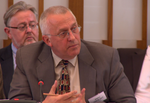James STEWART
contribution 10 -
STEWART James

tags
ICTR assessmentoriginal version
I’m going to change the tone just slightly and pick up on something that Lars said. And this is purely anecdotal. He talked about what was the impact of these trials on Rwandans. So I would just like to share with you, if I may, some of the experience I had as a line Prosecutor in the early days of the Tribunal dealing with the only Rwandans that I was dealing with very closely, namely, the witnesses or survivors and other witnesses of what had happened in 1994.
And I remember that we used to go and see our witnesses after each session in our chamber, after they had testified, when everything was finished and they were essentially getting ready to leave the safe house and go back home. Certainly one of the reactions that I remember, that impressed me was how amazed they were to see the people who had terrified them in the dock. They never thought they would live to see that happen. And it obviously made a very deep impression on them.
I remember one time going to see a group of witnesses with my colleagues, and they said to us, "You know, there are many very bad things said about the Tribunal in Rwanda. It’s very negative what is being said about the Tribunal. But we’ve come here and we see that this isn’t true. We see that the Judges understand us and understand what happened in Rwanda." So, although these were just a very tiny sampling of the population, they were going back to their families, those who had survived, and were bringing a very different message than the one that was at the time, in the currency of the time, we’re talking about 1997, ’98, the one that was very much apparently in the media and in the air in Rwanda, because the relationship that we had with Rwanda was not an easy one.
Now, the third thing I wanted to talk about is something quite different. I remember spending, with one of my colleagues, several hours in the house of a witness who had testified in one of our cases. I remember he finished his testimony when he was actually suffering from a bout of malaria. I thought that was most amazing fortitude and stamina that he had. He finished his testimony. But a couple of weeks after he got back to Kigali, he was shot and killed outside of his compound. And it was very hard to know whether it was an ordinary crime or not. Pierre will remember this. His family was convinced that it was because he went and testified at the ICTR that he had been killed.
The other anecdote I would like to share with you relates to the protection of witnesses. I remember being back in Kigali on one occasion and I was outside of the Umubano hotel, and I suddenly saw one of the witnesses that I had examined in one of our cases under a pseudonym. And I just stood and looked at him because I was afraid to give any kind of indication that I knew him because I thought that if I did, I would somehow be giving him away. But he ran across the street and embraced me, so I guess I didn’t have to worry. But it also, in my mind, showed his reaction to the process that he had been involved with and his feeling about the nature of what we were engaged in at ICTR in those days.
And the final thing I would just like to add is something that I don’t think probably anybody around this table knows, but Pierre Prosper used to go regularly back to Taba and visit the people that he had dealt with there, particularly the bourgmestre. The first time I ever went to Taba ‑‑ in fact, the only time I went to Taba I went with Pierre. And again I tell you, it doesn’t matter what system you’ve got, what really counts are the people that you’ve got. Thank you.
Vincent CHETAIL
Je donne la parole à Madame Silvana Arbia. Merci beaucoup.

